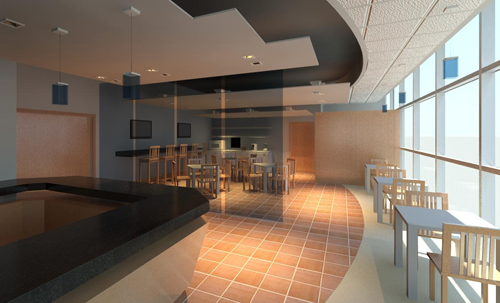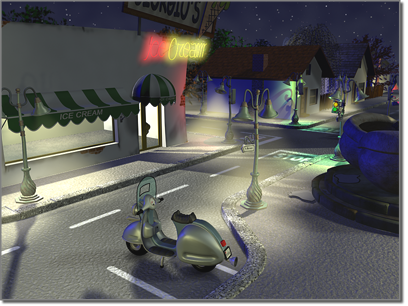![]()

Airport Lounge
An architectural scene with realistic lighting created by photometric lights
Stephen Jager, JCJ Architecture
Copyright © 2008
www.jcj.com
When there are no lights in a scene, the scene is shaded or rendered with default lighting. You add lights to give the scene a more realistic appearance. Lighting enhances the clarity and three-dimensionality of a scene. In addition to general lighting effects, lights can be used to project images. (See Advanced Effects Rollout.)
Light objects replace the default lighting. As soon as you create a light, the default lighting is turned off. If you delete all the lights in the scene, default lighting is turned back on. The default lighting consists of two invisible lights: one is above and to the left of the scene, and the other is below and to the right.
 Environment panel.
Environment panel. Types of Lights
3ds Max provides two types of lights: photometric and standard. All types are displayed in viewports as light objects. They share many of the same parameters, including shadow generators.
Photometric Lights
Photometric lights use photometric (light energy) values that enable you to more accurately define lights as they would be in the real world. You can set their distribution, intensity, color temperature, and other characteristics of real-world lights. You can also import specific photometric files available from lighting manufacturers to design lighting based on commercially available lights.
Standard Lights
Standard lights are computer-based objects that simulate lights such as household or office lamps, the light instruments used in stage and film work, and the sun itself. Different kinds of light objects cast light in different ways, simulating different kinds of light sources. Unlike photometric lights, Standard lights do not have physically-based intensity values.

A nighttime scene that uses standard lights for atmosphere rather than realism
Tips
- You can animate not only the location of a light, but also its color, intensity and some other creation parameters. See Animating Lights.
- You can use the Place Highlight command to change a light's position. See the Procedures in Working with Lights.
- A Light viewport can be a useful way to adjust lights other than omni lights.
- To simulate sunlight, use a daylight or sunlight system, which allows you to set the date, time, and geographic location of your model. The daylight system is photometric, while the sunlight system uses a standard directional light. Note: The standard Skylight light is distinct from the photometric daylight lights. The Skylight light is for use with light tracing.